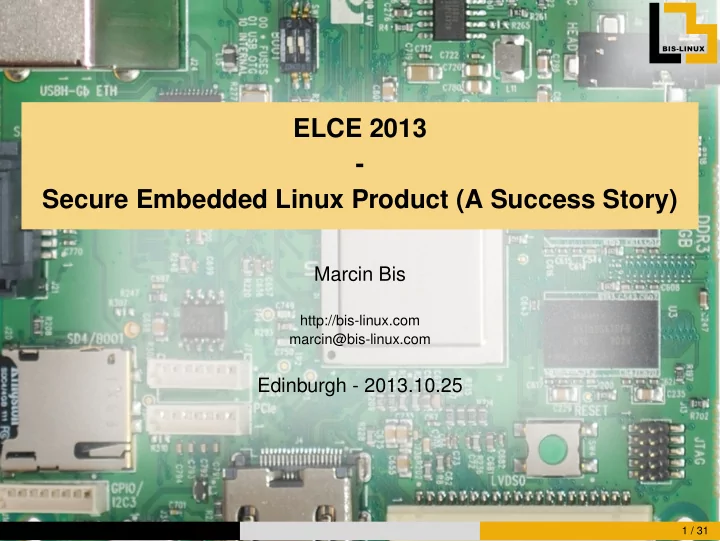

ELCE 2013 - Secure Embedded Linux Product (A Success Story) Marcin Bis http://bis-linux.com marcin@bis-linux.com Edinburgh - 2013.10.25 1 / 31
About me • Marcin Bis • Entrepreneur • Embedded Linux: system development, kernel development. • Esp. Linux + Real-Time - automation (industrial- and home-). 2 / 31
Agenda? I want to tell you about a success story. . . . . . protecting added value in a product. • A few quick words about security • Embedded security. • Attack vector and surface. • What is similar with standard system security? • Practical example - secured embedded Linux system. • A problem (bussiness view). • Active & passive security. • Examples. I will not talk about:: • Android • Web apps, dedicated apps, cloud. Embedded Linux Security 3 / 31
Attack surface One or more input methods of the system. • which can be accessed by untrusted user, • or access to which can be influenced. Embedded Linux Security Attack surface 4 / 31
Attack vector . . . to exploit a surface. Common ones: • network (TCP/IP , Wi-Fi), • application, • serial port. Less obvious: • USB, • I2C, • solid state memory (FLASH), • Bluetooth • GPS, cellular network. Less obvious == mode dangerous. Embedded Linux Security Attack surface 5 / 31
Embedded vs. standard Some differences: • Some attack vectors are unique to embedded devices. • Problematic updates (software monoculture). • People do not threat them as devices. On the other hand - same programs and services. (Wireless) network accessible. Apache, openssh, perl, avahi, dns, openssl etc. Embedded Linux Security Attack surface 6 / 31
Some examples • Stuxnet • FTP access to / via root account. • admin:default - common in network devices. • More, easy to find: http://lwn.net/talks/elc2009/ (2009). • Another example of hard-coded credentials: Embedded Linux Security Attack surface 7 / 31
Make it secure (trivia) Common methods are easy to avoid: • Restricted shell access, eg. serial port • strong password, • use PAM to auto-logout idle shells. • Other access methods to shell (web shell, ssh, telnet (!) etc.) • Strong passwords (+1). • Do not run all applications from root account. • Bug-fix-ed components. • Self developed vs. standard software. • Defensive programming. Embedded Linux Security Attack surface 8 / 31
Passive security Passive security 9 / 31
How the customer see the product? Passive security A problem? 10 / 31
How my customer see the product? • Hardware becomes cheaper and cheaper. • Expectations increases (let’s add functionality). • Linux and open source is a foundation of the software product. • Open-Source and Free Software gives us all freedom: • Every developer has the same rights. • And equal chances. • Customer will make money on added value • According to licences of course: • GPL • LGPL • BSD Passive security A problem? 11 / 31
Added value? Passive security A problem? 12 / 31
How to secure a added value? • possibility of "TiVo-lization", - do not go to far. • GPLv3 Passive security A problem? 13 / 31
Let’s do it! At first: • Nothing will stop user (abuser) from de-soldering an element and trying to analyze logic states. • Most SoC-s has hundreds of pins - it is difficult (but not impossible). It all depends on how determined you are ($$$). Security is a process not a product. Passive security A problem? 14 / 31
Hardware methods • BGP - it is harder to analyze data on bus, • inner layers of PCB are harder to access, • of using Application processor and external uC - add some logic to check timing (like watchdog). • TPM chips. Passive security A problem? 15 / 31
VIA (Wikipedia) Passive security A problem? 16 / 31
Hidden Via (3) (Wikipedia) Passive security A problem? 17 / 31
a sandwich (Wikipedia) Passive security A problem? 18 / 31
The problem. . . • It is not easy to debug firmware. Passive security A problem? 19 / 31
Let’s secure data • Sign it. • TPM • HAB • or encrypt it • Should be fast. • Performance penalty (esp. Real-Time). • Where to store the key. Passive security A problem? 20 / 31
How to encrypt rootfs Block devices (e.g. eMMC): • dm-crypt • man cryptsetup • LUKS Any filesystem • ecryptfs • sudo mount -t ecryptfs tmp1 tmp2 • problems using on rootfs (pivot_root, switch_root) • still, can be used to encrypt parts of filesystem. Cutomer wants to have a raw NAND device (wear leveling). Passive security A problem? 21 / 31
NAND How does it work? Passive security A problem? 22 / 31
JFFS2, YAFFS2, LogFS Passive security A problem? 23 / 31
UBI Passive security A problem? 24 / 31
UBI is nice. . . . . . for big NANDs: • http://elinux.org/Flash_Filesystem_Benchmarks How to add encryption? • It can emulate block device. • Use ecryptfs. • look at the source code. UBIFS arleady compresses data it writes. Maeby it could encrypt it too. • Using Crypto-API. Passive security A problem? 25 / 31
Passive security A problem? 26 / 31
On the other side: Passive security A problem? 27 / 31
Use proper block cipher openssl enc -aes-128-ecb -k "secret" -in logo.ppm -out out.ppm Passive security A problem? 28 / 31
Secured device The problem of storing encryption key - still exists. Passive security A problem? 29 / 31
Secured device. . . The problem of storing encryption key - still exists. • Put it as DT attribute. • Modify NAND driver to use it. Encrypt kernel+DT using functions of the Chip. i.MX28 SecureBoot Passive security A problem? 30 / 31
Thank You! What is important? Security is not a product. it is a process. What else? Internal attacks. I do not even trust myself. Questions? Passive security Thank You! 31 / 31
Recommend
More recommend